International education is as important to Australia, as Australia has been for international students. Represented as Australia’s third greatest export at a value of $33.9 billion, 2019 saw 758,154 full-fee paying international students in Australia.
A 9.7% increase over 2018.
Though 2020 has seen a steep fall in the number of international students enrolling in Australia (thanks to COVID-19), the ones who are already here have no other way than to go forward. But it hasn’t been easy.
Being an International Student in Australia
I came to Australia to pursue higher studies in 2017. As a professional with a ‘non-tech’ skillset, I know how difficult it is for an international student to get a job here. For the sake of this article, I’ll be sharing the journey of communications graduates in Australia. But their learnings hold true to each and every international student, irrespective of your field of study.
I’ll share my journey in detail towards the end of this article.
16 Australian Universities rank in the global top 200 in the field of Communication & Media Studies, as per 2020 QS World University Rankings.
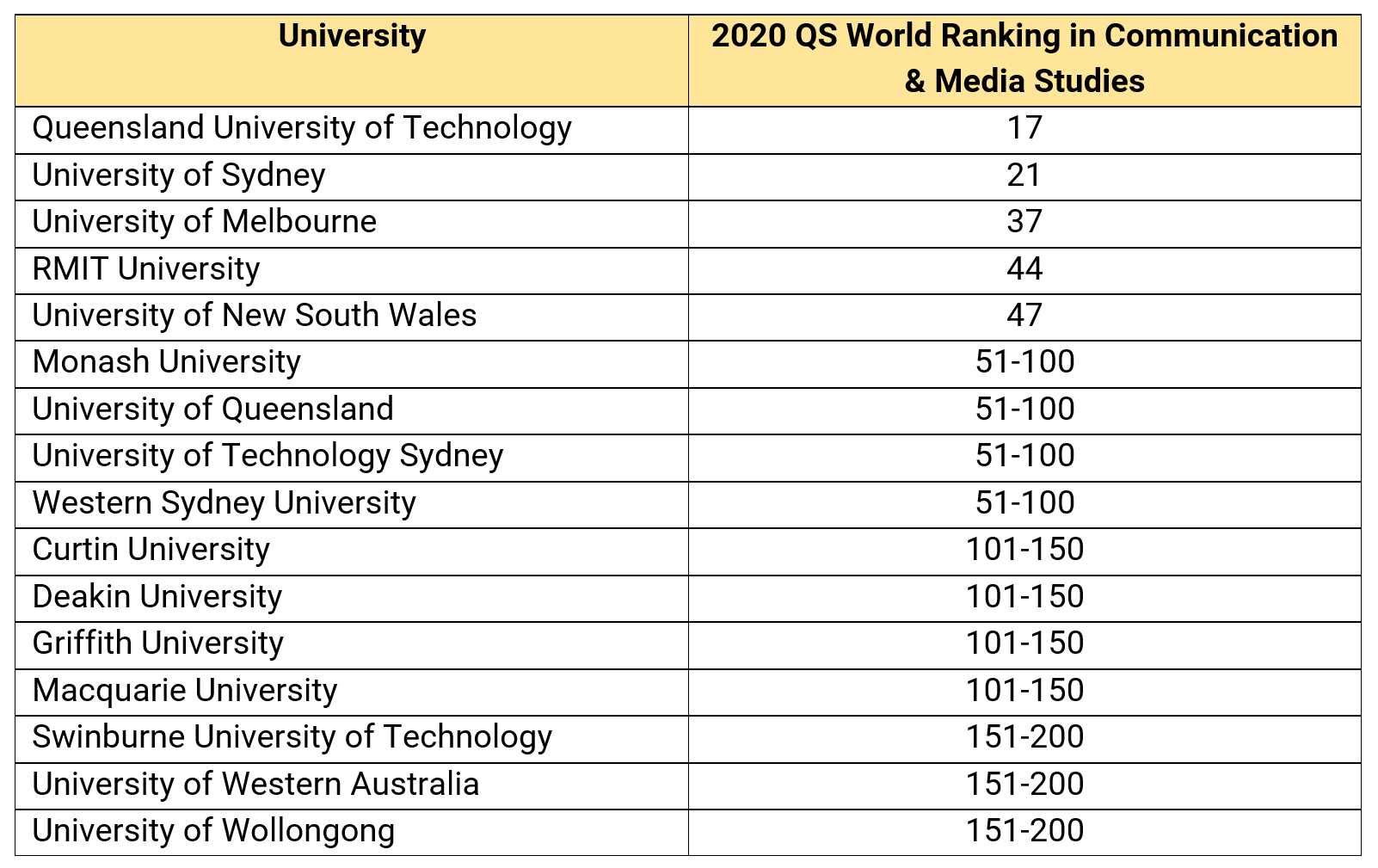
In spite of this, the communications industry hasn’t been too welcoming for international graduates.
There are quite a few barriers faced by them:
- Competition from domestic applicants – who companies believe understand the local market better.
- Visa restrictions – after completing their studies, international students in Australia gain a 2-year work visa. Hence a lot of companies refrain from hiring them as long-term contracts would not be possible.
- PR (Permanent Residency) restrictions – a lot of companies advertise communications roles with the criteria that only citizens or PR holders can apply. This makes international graduates ineligible.
- Communication roles in the government sector – are inaccessible for international graduates. Only citizens or PR holders can apply for them.
While these reasons might make you feel that all’s lost. That’s not true. There’s always a silver lining.
It’s all about what additional efforts you take to make a difference.
7 International Graduates in Communications Who Defied All Odds
I reached out to 7 international graduates in the field of communications and asked them two things.
- It isn’t easy to crack the communications industry in Australia, especially as an international student. How did you pave your path for success?
- One piece of advice to international students on cracking the communications job market.
Each one of them has had a different experience. A different journey. But there’s a lot we can learn from each of these stories.
Here’s what they had to share.
Manmeet Kaur (India)
“On the day of my course orientation, I interacted with senior international students in comms, where I understood it’s a rocky road ahead for me. The 2 ideologies I followed from day one were:
- Be actively involved in university life because it is a treasure of opportunities.
- Don’t hesitate to interact with people on every platform.
I explored my options daily, within the university and outside. I took baby steps to keep myself updated. And soon realized how imperative it is for you and your work to be visible.
My zeal to be out there and build meaningful relations helped me land my first role at Australian Community Media as a Media Sales Coordinator within 2 months of graduating from university.”
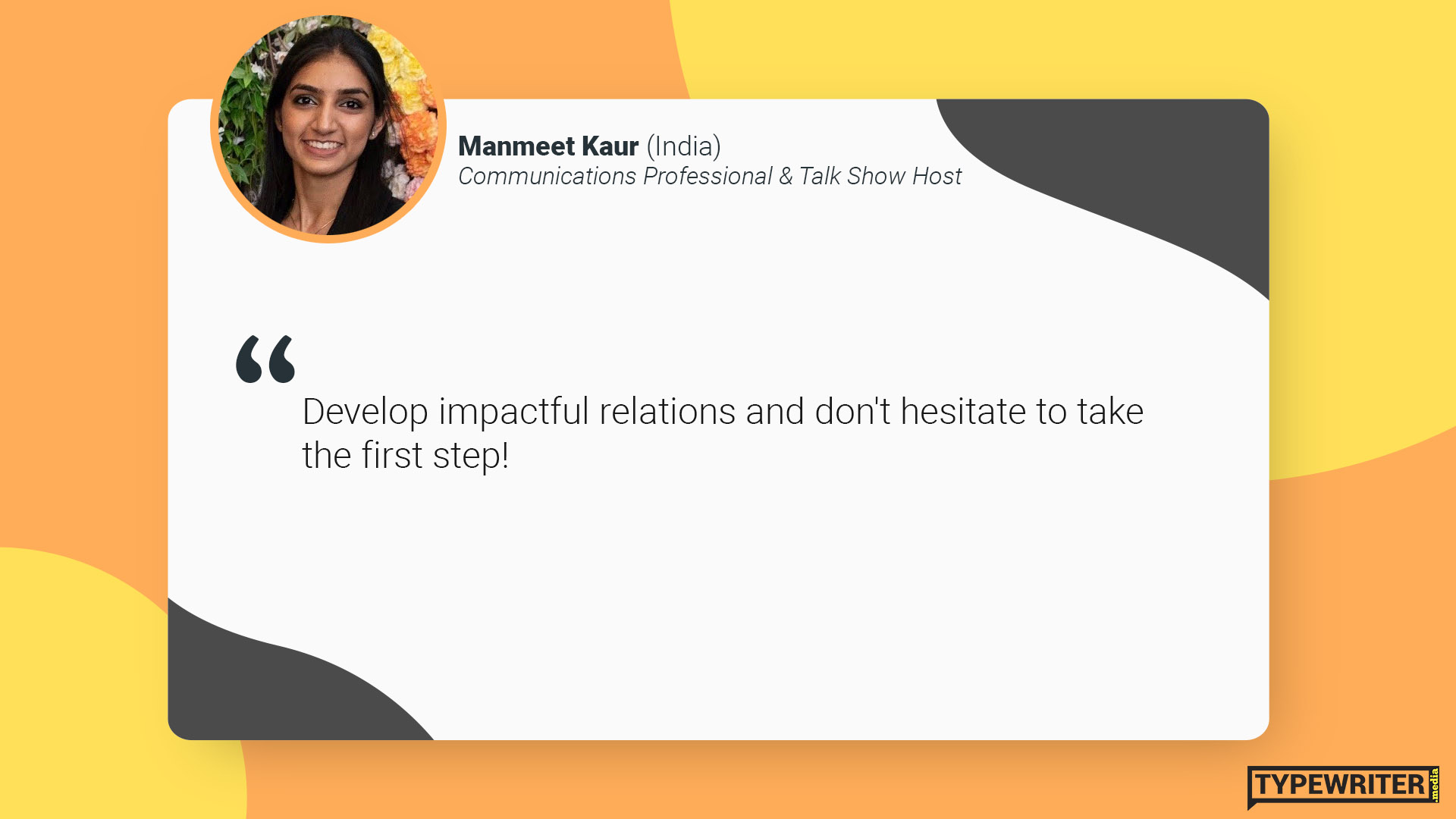
Sabrina Schmid (Switzerland)
“It is difficult to land a job in the Australian marketing/communications industry. And these turbulent times of a global pandemic have definitely not contributed for the better.
Ever since I graduated, I have been networking a lot and made sure to regularly touch base with people I know/have worked with in the past. I have either asked them for help or potential referrals, which has at times worked out really well.
Furthermore, I have applied for jobs. Hundreds of jobs. And I kept applying for quite some time since this was all I could do. But most importantly, I never lost hope. Albeit this application process was very frustrating, I reminded myself that everyone is in the same boat.
Lastly, since the job market is currently even more competitive and the world is somewhat at a mandatory standstill, I’ve grabbed the opportunity and founded my own company with two other friends.”
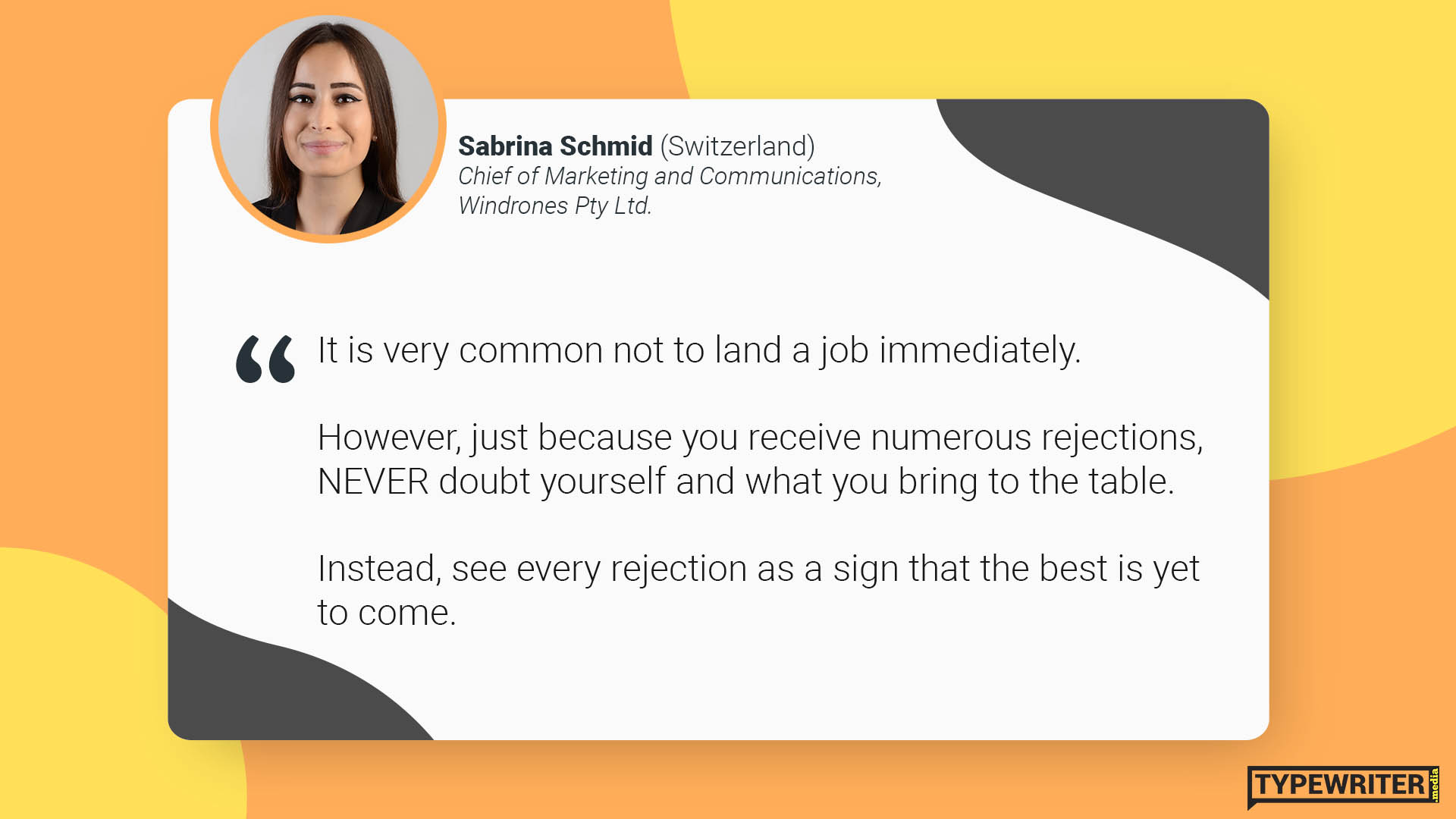
Trang Le (Vietnam)
“As international students, there are a host of structural and institutional hurdles for us. Be it visa conditions, or lack of local experience that we face when navigating the Australian job market. I remember feeling uncertain at best and fearful at worst.
That said, I genuinely enjoyed my academic experience at university and tried to make the most out of it. I registered to join every seminar, event, and panel discussion held by the Faculty of Arts. As a feminist, I was struck by a panel discussion at the university’s media festival, where Futureye’s CEO (my current employer) was invited to talk about the normalizing process of social norms initiated by the #MeToo movement. I then did a bit of research about the company.
A year later, my current employer was seeking to fill a graduate-level position and fortunately, I was referred by my Course Director for an interview and was successful. I am now working as a consultant, specializing in risk communication and stakeholder engagement, which falls outside the traditional marketing and communications role that I’d expected when starting my degree. This couldn’t have been possible without the opportunity to engage with both industry professionals and academic researchers during my university journey.”
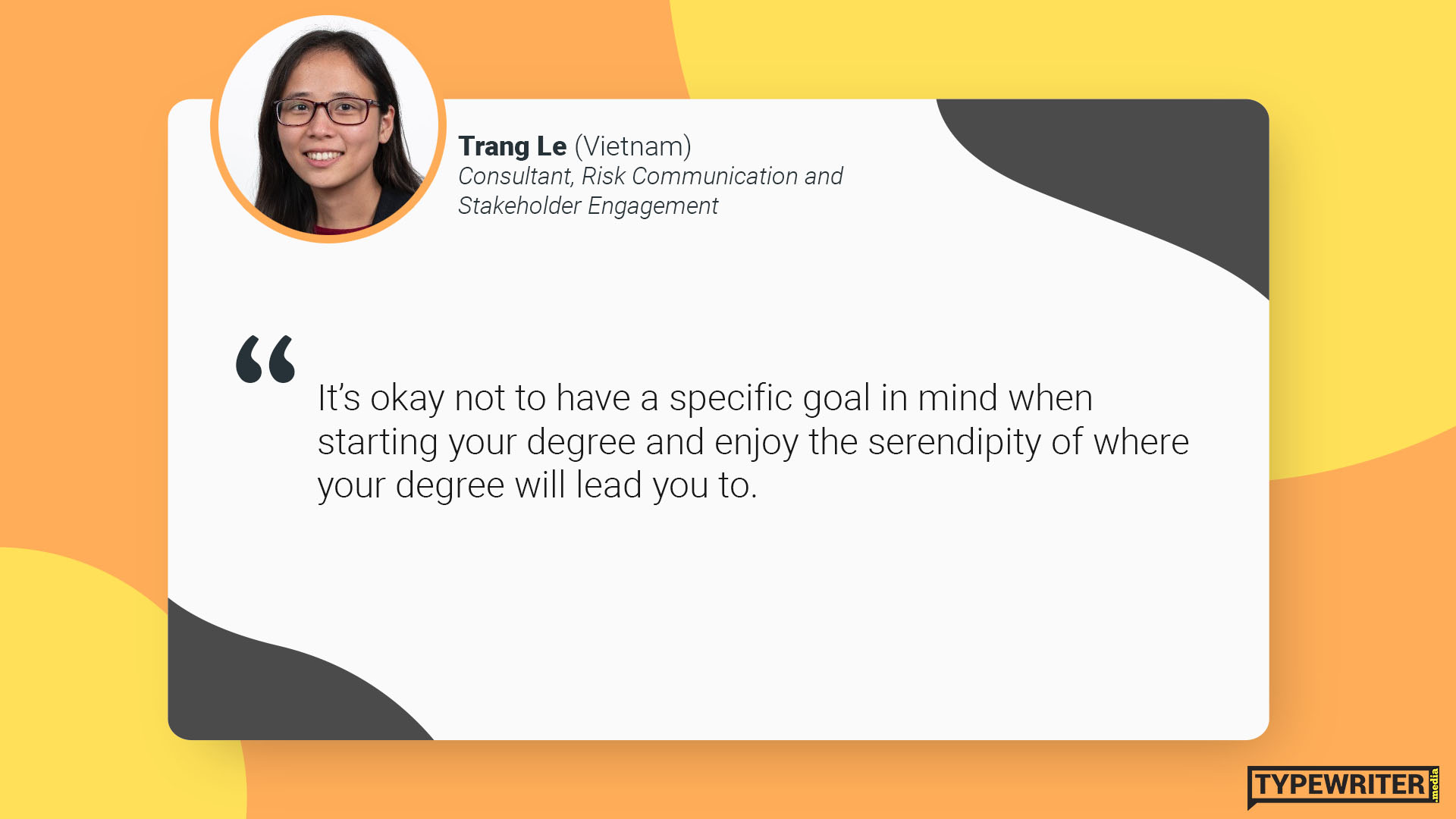
Subscribe to Typewriter Media weekly newsletter on Communications & Content Strategy.
Harmeet Kaur (India)
“I got an internship with a startup in the first month of arriving in Melbourne. I did not aim big at that time although I planned to do something big.
I built my own portfolio website, worked on my LinkedIn profile, completed relevant certificate courses, and engaged with like-minded people on LinkedIn. All of this helped me in cracking a good job soon enough.
There’s also some maths to consider. This is the thing I have learnt from my own experience. If you have intermediate experience in your field, it just weighs 40% to help you land a job. About 20% is your personality and extracurricular activities. When preparing for an interview, make sure you learn the nuances of storytelling.
And then comes the most important part- contacts. Believe me, if you are not making any efforts on this, you are packing your suitcase to go back home.”
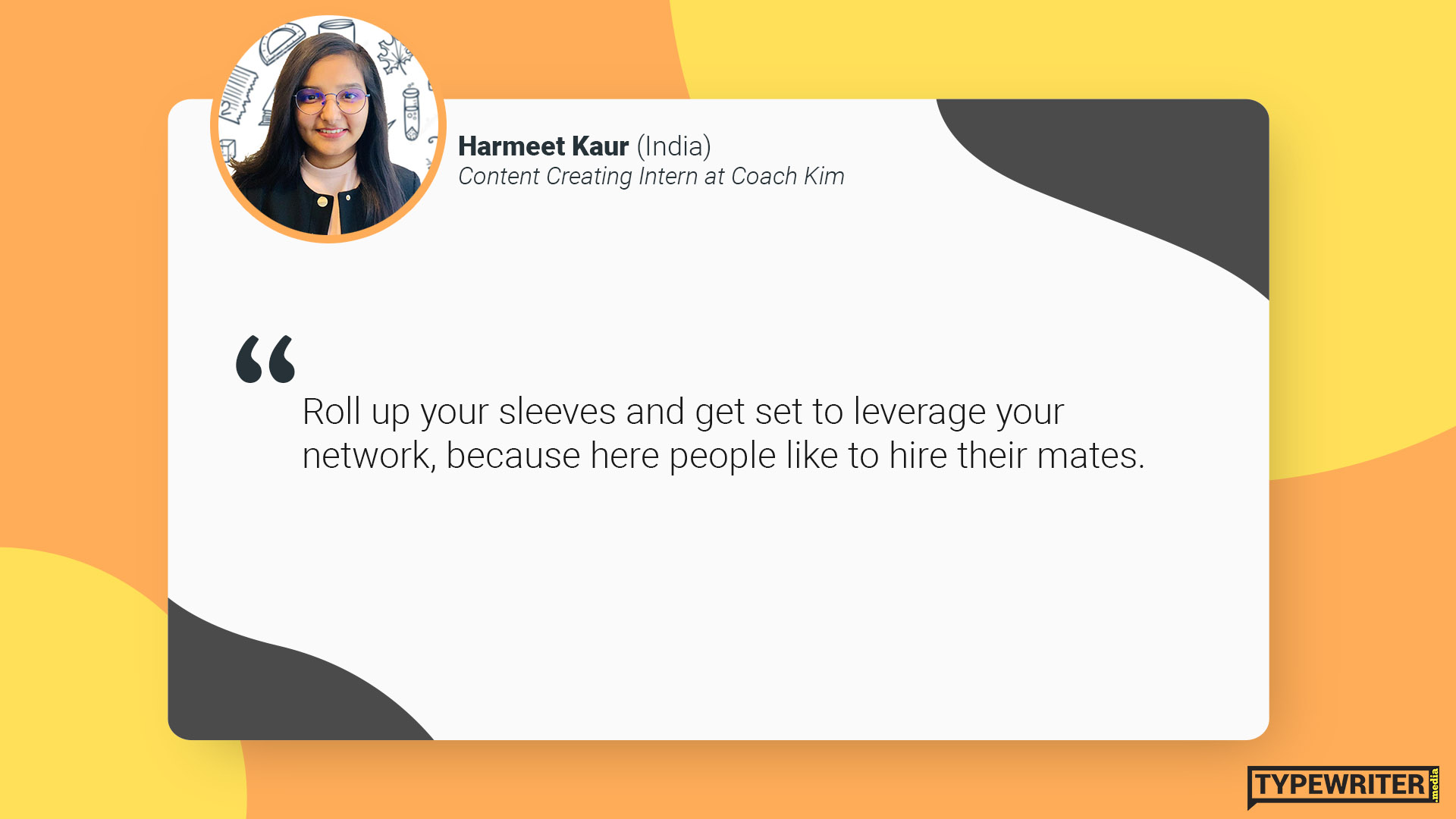
Wenzhu He (China)
“To me, to crack the communications industry in Australia is not ‘difficult’. It is ‘very hard’, especially in this global pandemic time. And even harder as an international student.
I have been continuously thinking – what’s important to me? A job opportunity to support me and give up what I’m passionate about. Or doing something I love, but with an empty pocket. I figured out that it doesn’t have to be a single choice.
I am an international student but also qualified and experienced in some other areas. I can do what I’m good at, to support myself. I spend my spare time writing and video editing. I can’t expect to benefit from it right now, nor in the short run. But I’m trying to acquire as many readers and audiences as I can, by writing, shooting, and introducing Australia to people from other countries (mainly China).
In this process, I practice my skills in writing, editing, and running an active social media channel. I’m not eligible to talk about success as I’m still at the stage of experience accumulation. But when the time is right, I believe it will lead to something really valuable.”
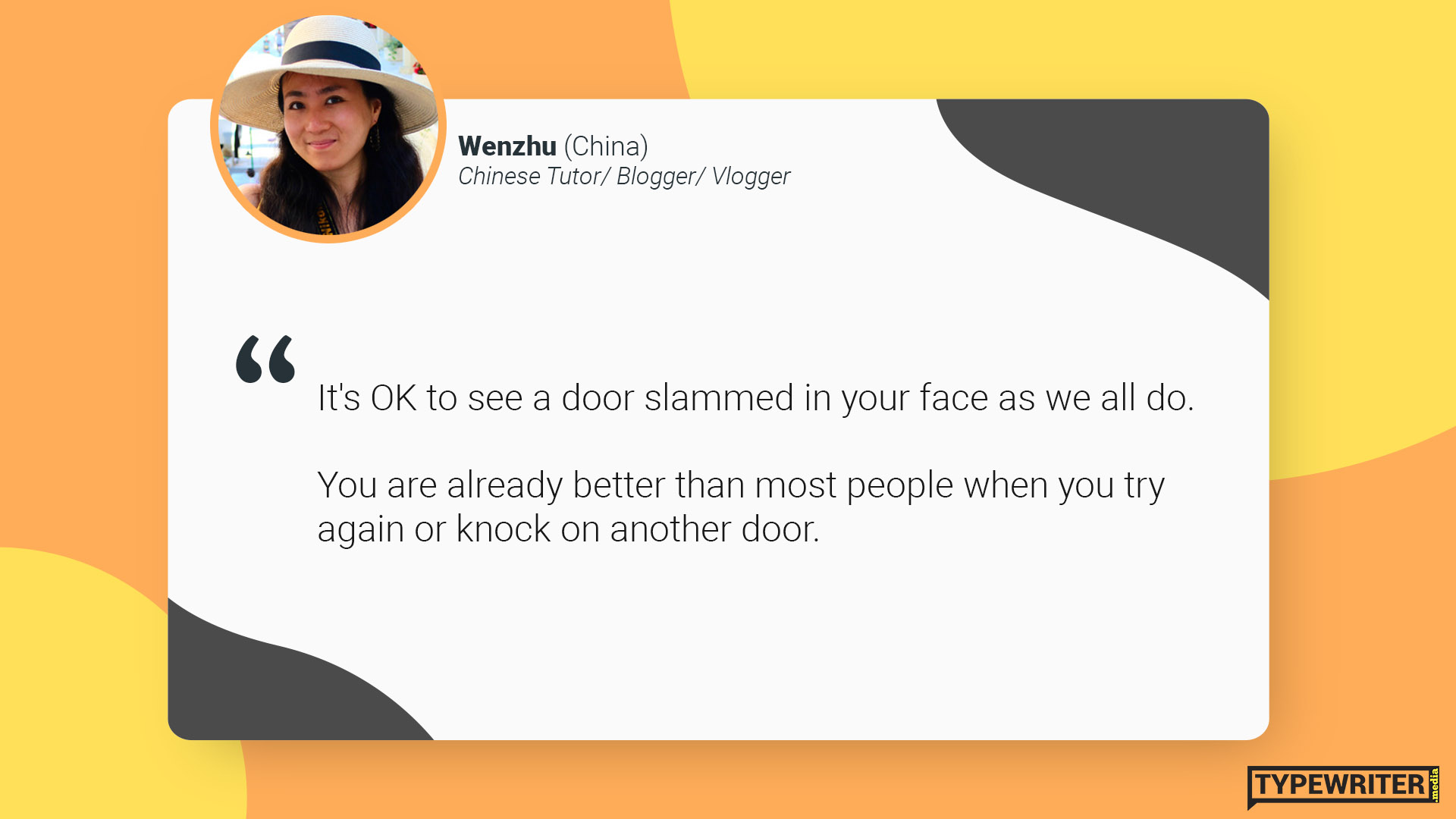
Hoang Vu (Vietnam)
“My key strategy is engaging in activities that will keep my energy levels high as well as maintain my focus on the job search.
For instance, I usually spend my free time, especially during the recent lockdown periods, listening to podcasts, reading blog posts about the creative industry, and practicing my design skills by watching tutorial videos on YouTube.
Additionally, I am always open to job opportunities to further develop professional skills and experience, even if they are just unpaid internships or temporary roles in small businesses and startups.”
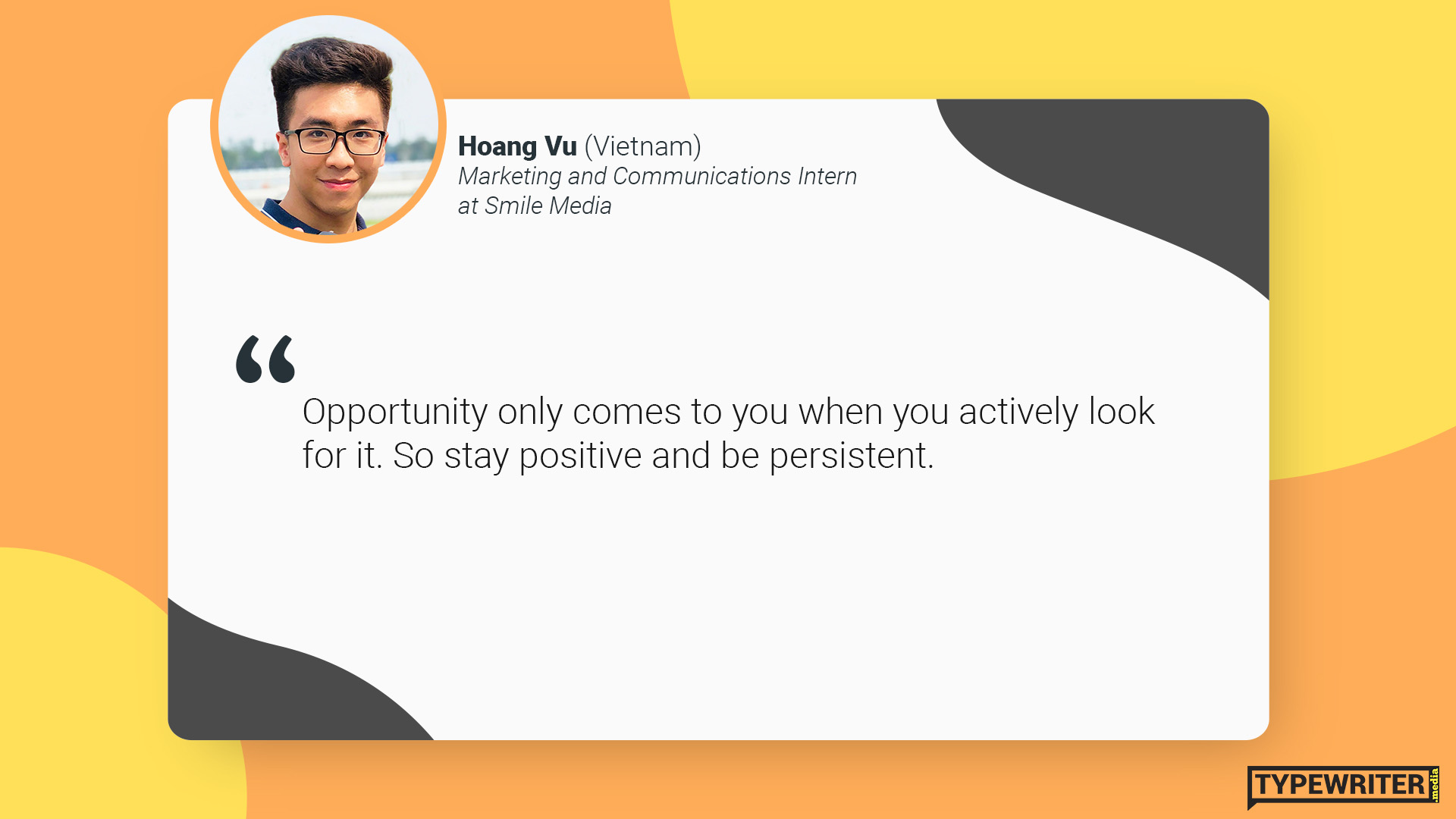
Shrishti Dokwal (India)
“Especially for an international student, it is difficult to crack the communications industry in a completely new city/country. But I believe networking and thorough knowledge combined, goes a long way in setting up a good foundation for success in the industry.
I landed my first internship in Melbourne in the communications industry simply through a fellow friend’s recommendation. But networking alone isn’t enough. It is also about showcasing and applying one’s theoretical knowledge in a practical environment.
By connecting with relevant people in the industry, being out there, and showing people what you are truly capable of, you are more likely to land an internship or a job than otherwise.”
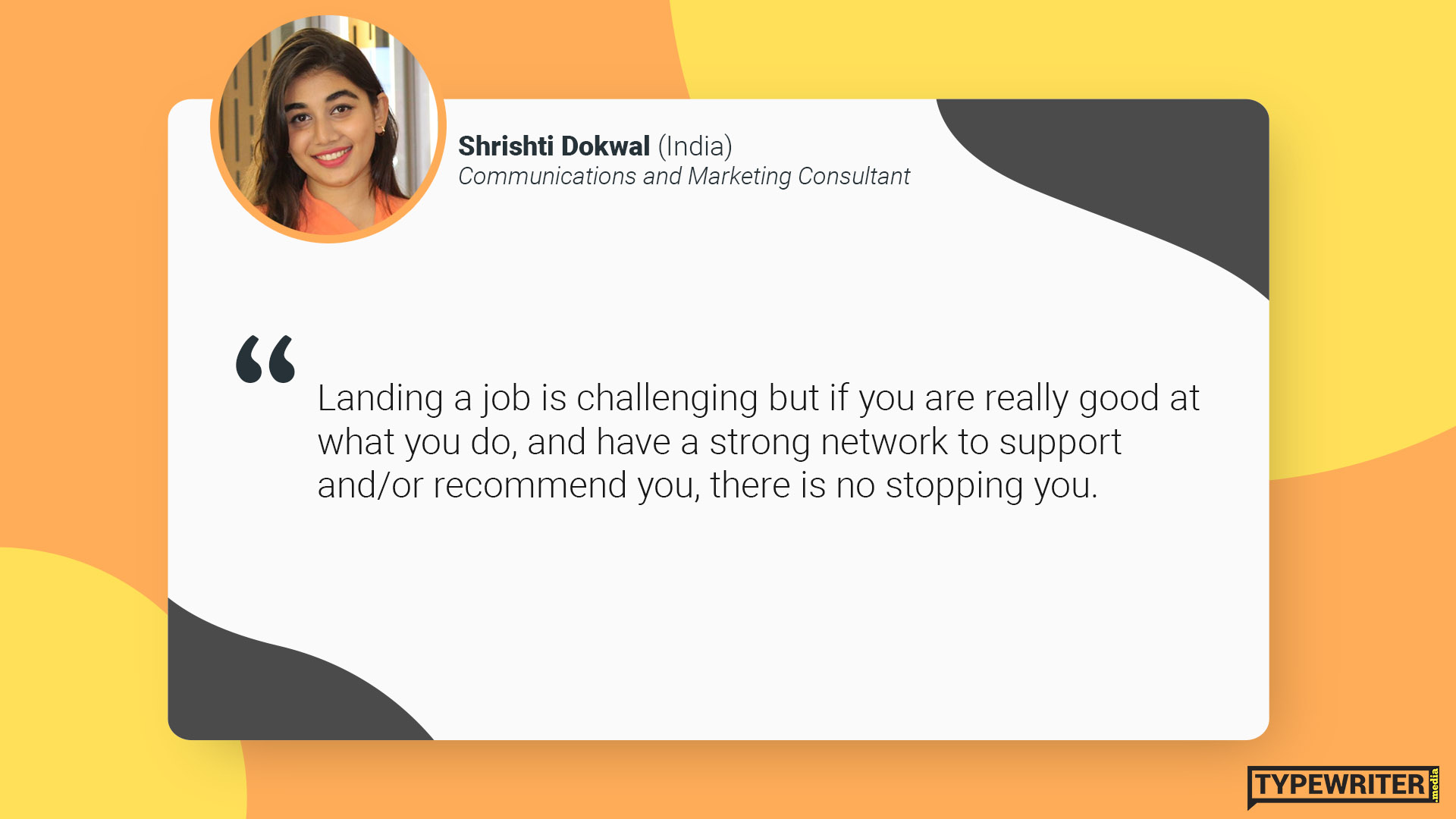
Bonus: My Personal Journey
I’ll keep this short and the self-brag to a minimum.
In 2017, after I came to Australia and joined university, I volunteered for anything and everything that came my way. And most importantly, said yes to every opportunity.
Over the next 2 years,
- I started a student association in university,
- won Student Advisor of the Year award,
- won the Dean’s Award for student leadership,
- built really strong relationships with my lecturers, university staff, and other industry professionals,
- and volunteered in various leadership roles with a global non-profit.
While volunteering for a media festival at my university, the event staff saw my expertise and offered me a job the next week. Until I completed my studies in December 2018, I stuck with that casual role as Events Officer at Monash University.
The next month, through a referral from my previous manager, I landed a full-time job with Monash University, where I still continue. Also received a job promotion exactly 11 months after joining.
Of late, in April 2020 I started Typewriter Media as a Communications & Content Strategy blog/consultancy. In the last 6 months, I have worked with 11 clients, keeping my side hustle active.
My advice to international students
Just 4 simple points –
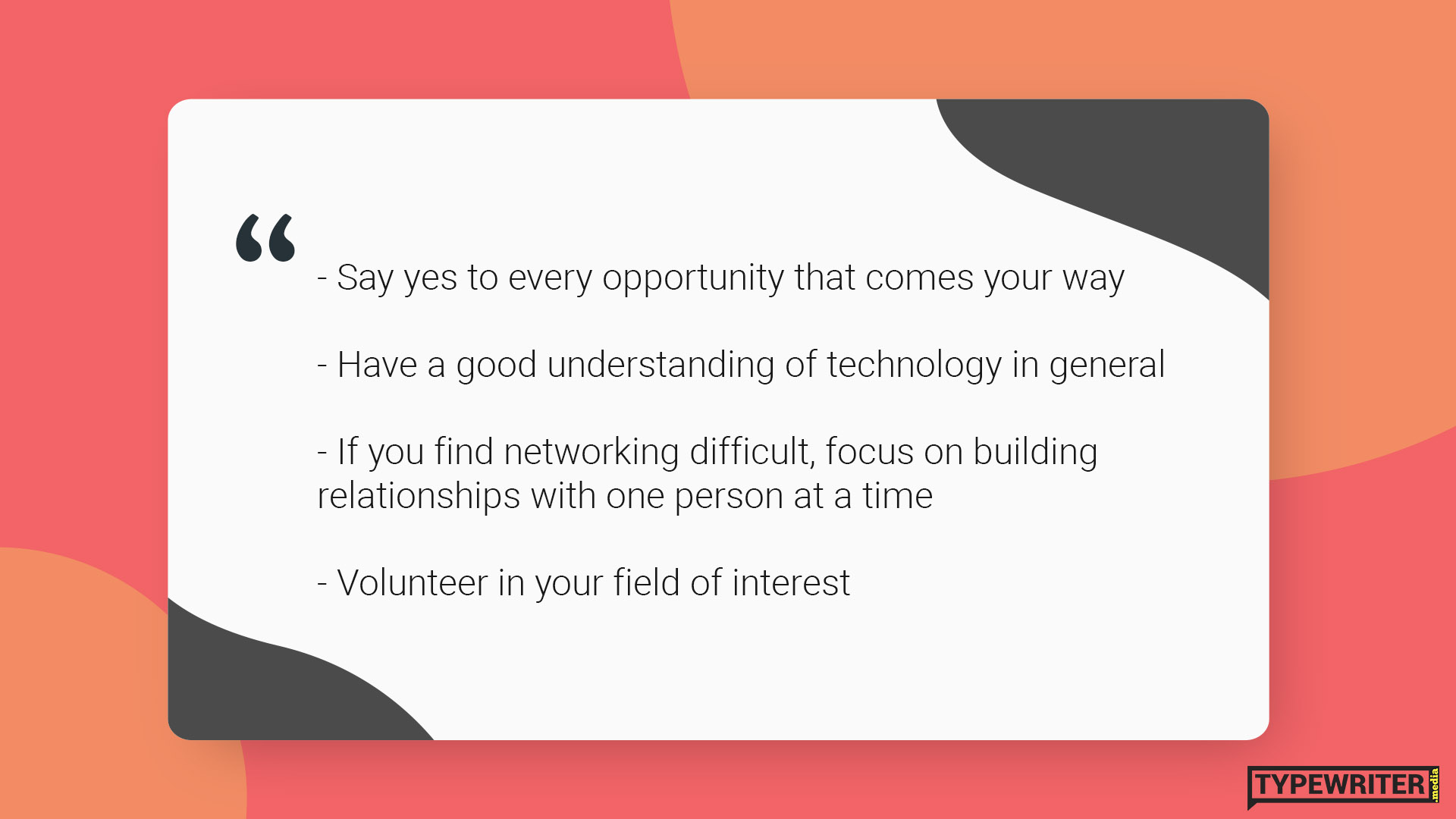
- Say yes to every opportunity that comes your way. If there isn’t an opportunity of your interest, see if you can create one for yourself.
- Have a good understanding of technology in general. I don’t mean that you should learn to code. But going forward, in a highly technology-dependent world and industry, the more understanding of tech you have, the better your options.
- If you find networking difficult, focus on building relationships with one person at a time. And the best way to build a professional relationship is to ask them for their advice.
- Volunteer in your field of interest, and maybe even slightly broadly if you think it can add value to your learnings/skillset. You’ll be amazed at the opportunities that can arise through your volunteering commitments.
I invite you to join my weekly newsletter. Just drop in your email below and I’ll send you awesome content every week.
Template vector created by freepik - www.freepik.com



